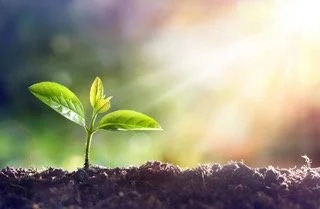By Leah Kelley
Horticultural Therapy is a small but “budding” field. I’m not surprised when folks haven’t heard of it, but as you may imagine, it is similar to play therapy or art therapy, using gardening as a healing tool. Many home gardeners are familiar with this: after a long hard day, there is something so soothing in quietly starting seeds, finding hope in the potential growth. In my time working with youth gardening programs, I’ve seen how healing it can be to be outside, being a steward of plants, and how the garden becomes a safe, comforting space for difficult conversations. Gardens are also ideal for building mindfulness, through listening to the sounds in the garden, smelling herbs, sowing seeds, focusing on breath in an outdoor space, and more!
One of my favorite things that gardens offer as a therapeutic tool is the many metaphors found in nature. I am continually amazed at how food scraps can be turned into rich soil through compost, with enough time and attention. This process of decomposition can shed light on how difficult situations in our own lives have potential to nourish us in the future, through the lessons we learn and grow from.
Here are some more plant metaphors that can open up conversations with your child and/or client:
Sowing – Hope. The smallest seed has hope in the soil that life and growth may come forth. What is like a seed, giving you hope to grow in your life?
Growing – Opening to change, we all go through stress, and it may open us up to have a better space to grow.
Maintenance – As I learn to care for the plant I learn to care for myself.
Plant Resilience- We too can withstand dry seasons.
Harvesting- Finding satisfaction at the end of your work, a harvest in which it took pains to grow.
There are so many lessons we can learn from plants in our daily lives. With a little time to slow down and notice, we may find that we are not so different from plants after all!
Horticultural Therapy Activity: Noticing
“Nature Does Not Hurry, Yet Everything Is Accomplished.” - Lao Tzu
In our quick-paced lifestyles, we often don’t take time to pause. Find a place in nature to sit and notice for 5-10 minutes at a time, and continue to come back to it daily or weekly to take in the sights, smells, and sounds. Notice how it changes - or stays the same.

